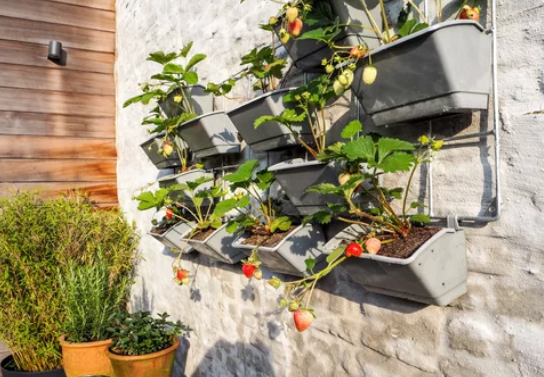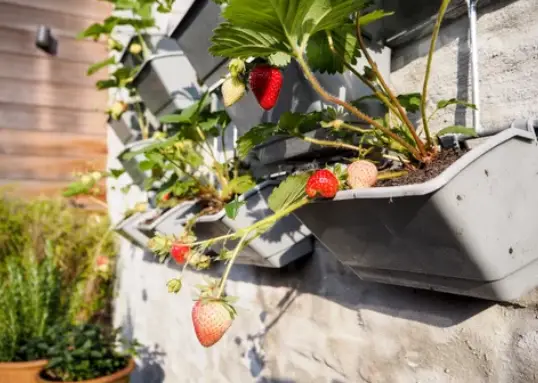Benefits of a vertical garden. Vertical gardens are becoming more popular in a lot of households.
Growing your own vertical gardens is more efficient and can help with air quality problems. They also provide a sense of calmness and beauty.
Vertical gardens are perfect for people who have limited space or have an apartment that doesn’t have much sunlight.
They also help with air quality because they filter out some toxins from the atmosphere, like carbon dioxide and sulphur dioxide.
Space-Efficiency and Urban Greening
One of the most significant advantages of vertical gardens is their efficient use of space. In cities where land is at a premium, these gardens allow us to introduce lush greenery without sacrificing valuable real estate.
Vertical gardens can be integrated into virtually any vertical surface, whether it’s the side of a building, a fence, or even a freestanding structure. This creative use of space not only beautifies urban areas but also contributes to urban cooling, mitigating the heat island effect prevalent in many densely populated regions.
Vertical Garden Benefits

Vertical gardens, also known as green walls or living walls, offer a range of benefits that make them an attractive option for both indoor and outdoor spaces. Here are some of the key benefits of vertical gardens:
- Space Efficiency: Vertical gardens allow you to utilize vertical space, making them ideal for areas with limited floor space. They are particularly useful in urban environments where outdoor space is scarce.
- Improved Air Quality: Plants naturally filter and purify the air by absorbing pollutants and releasing oxygen. Vertical gardens can significantly improve indoor air quality by increasing oxygen levels and removing harmful toxins.
- Noise Reduction: The dense foliage of a vertical garden can act as a natural sound barrier, helping to reduce noise pollution in busy urban areas.
- Aesthetic Appeal: Vertical gardens are visually striking and can enhance the beauty of any space. They can be customized with various plant species, colors, and patterns, creating a unique and captivating visual display.
- Thermal Regulation: Plants absorb sunlight and heat, which can help regulate indoor and outdoor temperatures. This natural cooling effect can be particularly beneficial in reducing energy consumption for air conditioning.
- Stress Reduction: Research has shown that the presence of plants and greenery can have a positive impact on mental well-being, reducing stress and promoting relaxation.
- Biodiversity: Vertical gardens can accommodate a diverse range of plant species, contributing to local biodiversity. This can be especially important in urban environments where green space is limited.
- Urban Agriculture: Vertical gardens can be used for growing herbs, vegetables, and fruits in urban settings, promoting local food production and reducing the need for transportation of produce.
- Privacy and Screening: Vertical gardens can provide privacy by creating a natural barrier between spaces, blocking unwanted views, and adding a sense of enclosure.
- Branding and Identity: For commercial spaces, vertical gardens can be used as a unique branding element, helping businesses create a distinctive and memorable identity.
- Educational Opportunities: Vertical gardens can serve as educational tools, helping people learn about different plant species, ecosystems, and the importance of sustainable practices.
- Conservation of Natural Resources: Vertical gardens use less soil and water compared to traditional gardens, making them more resource-efficient and eco-friendly.
- Reduced Urban Heat Island Effect: Urban areas often experience elevated temperatures due to the heat island effect. Vertical gardens can help mitigate this effect by providing shade and cooling through the process of evapotranspiration.
- Health Benefits: Interacting with nature, even in urban environments, has been linked to improved mood, reduced stress, and better overall mental and physical health. Vertical gardens offer an opportunity for people to connect with nature on a daily basis.
While vertical gardens offer numerous benefits, they also require proper maintenance, irrigation systems, and consideration of plant species to thrive. Additionally, the initial setup costs and ongoing maintenance may vary based on the size and complexity of the installation.
Plants can Help Clean the Air and Reduce Pollution
Plants are an essential part of the natural world, and they can help clean the air and reduce pollution.
They can absorb carbon dioxide, which is a greenhouse gas that contributes to global warming.
Also produce oxygen, which is one of the most important gases in our atmosphere.
There are many plants that can help purify the air and reduce pollution.
of these plants include:
bamboo, pine trees, ferns, and palm trees.
- Bamboo is the fastest growing plant, so it can help clean up the air and make it healthier.
- Pine trees are a great way to reduce pollution because they have lots of “organic acids” that help disperse water vapor in the air and break it down into the ground
-
Ferns are very good at cleaning the air because they have a vast number of “microscopic pores” on their leaves that let out water vapor and other particles through their tiny holes.
Plants Can Reduce Noise Pollution and Help You Relax
Plants can reduce noise pollution and help you relax.
They also have other benefits, like improving air quality, reducing stress levels, and enhancing cognitive function.
Plant-based solutions for noise pollution are becoming more popular these days because they are effective and easy to implement.
There are a number of plants that can be used to create a noise reduction solution in your home or office.
The noise is reduced as the sound waves are diffused through the foliage and leaves. These plants include:
- Carpet plants
- Peace lilies (Spathiphyllum)
- African violets (Saintpaulia)
- Dracaena sanderiana
- Striped dracaena Plant
Mental Health and Well-being in the Vertical Garden
The presence of greenery has a profound impact on our mental well-being. Research has shown that exposure to nature, even in urban settings, can reduce stress levels, improve mood, and boost cognitive function.
Vertical gardens create serene oases amidst the hustle and bustle of city life, offering a place of respite and connection to nature. They provide an opportunity for people to reconnect with the natural world, even if only for a brief moment.
A vertical garden can Air air quality.
Vertical gardens act as natural air purifiers, filtering out pollutants and producing oxygen through the process of photosynthesis. As city air becomes increasingly laden with toxins, the ability of vertical gardens to absorb carbon dioxide and release fresh oxygen becomes a crucial asset.
These living walls absorb particulate matter and volatile organic compounds, contributing to cleaner air and a healthier living environment.
How to Grow Plants and Where to Put Them in Your Home, Office, or Study
There are many benefits to having plants in your home or office. They help bring life to a space and can improve mental health.
There are different types of plants that you can put in different rooms in your home or office. Some plants are better for the kitchen, others for the bedroom, some for the bathroom, and some even work as houseplants.
Some plants require more care than others, so make sure that you know what type of plant you want before purchasing it.
Do not forget to take into account any requirements that the plant might have, such as light, watering, and temperature.
Some plants also require regular maintenance, such as pruning. and repotting.
It is not easy to maintain a small houseplant or apartment balcony.
There are a limited number of plants you can plant and this makes it harder to keep the plant healthy and alive.




